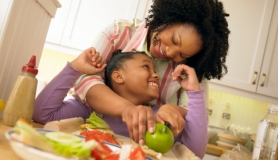When my partner and I had discussed having a child, it always seemed the natural and equitable choice for us to each take a year out of work to look after our child. When we had our daughter in 2020 and put this into practice, it became clear that fathers taking an equal share of the incomparable wonders, worries, exhaustion and elation of caring for babies and toddlers is still a sadly rare reality. For us, sharing the care of our child in her first two years has been challenging but hugely rewarding. We believe it has helped to shape and strengthen our family and our daughter.
Balancing childcare
Our daughter, Elliot was born in September 2020; luckily between lockdowns but still within the peak of the pandemic chaos of the last few years. My visions of spending my maternity leave drinking coffee with my new breastfeeding friends soon faded as further lockdowns were announced and playgroups and support groups closed up or retreated into online-only spaces or awkward outdoor gatherings under umbrellas. Using our savings I was able to look after our daughter full time for just under eleven months. At that point she was just starting to walk and eat some solid food alongside breastfeeding.
As I headed back to the office for four and a half days a week, my partner became a full-time stay at home father for the next 12 months.
Sharing time equally
For us, this arrangement seemed the obvious choice. Me doing the first year would mean that our baby could be easily breastfed. Sharing the time equally seemed fair and fitted with our finances as I was earning more than my partner. But more importantly it would mean that we would both get to bond with our daughter and get to see those wonderful baby and toddler years.
I was looking forward to seeing colleagues and taking on the new challenge of being a working mother but the transition was a hard adjustment for all three of us. Our daughter was still getting the majority of her nutrition from breastmilk so this meant big feeds before work and as soon as I walked through the door on my return. I expressed milk during my lunch break to keep up my supply for the weekends and relieve my full breasts but our daughter rarely accepted bottle feeds. Our daughter had loved breastfeeding, and I had used it as my main parenting tool. My partner had to find new tools to comfort our daughter, get her to sleep and keep her fed and contented. Although I was lucky enough to be able to work from home some of the time, which meant I could breastfeed her in my breaks, we found that the day often ran more smoothly for my partner and daughter if I left the house to go to the office. This sometimes left me feeling rejected and distanced from our daughter. Probably the biggest adjustment was ceding the day-to-day responsibilities of raising our daughter and running our home to my partner. As he was now her primary carer and spending more time in our home, it was necessary for him to make decisions and set the patterns for our daughter’s daily activities and our life admin. I then had to fit in with these patterns and priorities on my days at home. I found the loss of control challenging but also liberating.
Outdated views
Looking back, the majority of the challenges did not come from within our family unit – they came from the societal expectations and norms around the care of babies and toddlers. Despite the UK’s progress towards equality between the sexes in many areas, the sad reality is that, even today, a father taking on the full-time care of a baby or toddler is still unusual and is regarded by some as unnatural or undesirable. A pregnant woman might have to negotiate with her employer for the amount of time she takes for maternity leave and for flexible or part-time working arrangements on her return to work. She would not, however, have to convince her employer that she needs to spend time with her baby for the sake of the baby and for herself; these are regarded as valid needs that are self-evident. This is not the case for expectant fathers. A number of our male friends have had to explain and justify to their employers that they want to work part-time in order to share the childcare because they want to spend time with their young children. This says something about how parts of our society still fail to value childcare and the role of fathers. The very limited take-up of shared parental leave is symptomatic of these outdated assumptions and values around the proper roles of mothers and fathers.
My partner is self-employed so did not have to deal with this particular inequality but he still faced plenty of challenges in caring for our daughter.
“Sharing the care of our child in her first two years has been challenging but hugely rewarding. We believe it has helped to shape and strengthen our family.”
Creating more inclusive spaces for parents and kids
Many mothers will identify with the trepidation of walking into a playgroup or toddler activity group for the first time and trying to make conversation with the other mothers, who seem to know each other already. Now imagine the same scenario where you are the sole father walking into that group of mothers. Then imagine how you would try to contribute to a conversation about pelvic floor exercises or nipple pain during breastfeeding. This is an area where mothers can easily help fathers at least – if you see a new father at one of your groups, do say “hello” and help him feel included! Our experience has also been that family, friends and healthcare professionals are more likely to give well-meaning but unsolicited parenting advice to a father rather than a mother. People seem far more ready to question the parenting decisions of a father (who is regarded as doing his best but is ultimately “not the child’s mother”) compared to a mother (who is regarded as the authority on the child’s wellbeing). The fact that there are so few full-time fathers, and the tendency for men to have smaller social networks, also means that they do not have the same support village that mothers have and can feel isolated.
Despite these challenges, both my partner and I have found immense lasting benefits from the year that he looked after our daughter.
Most importantly, my partner and our daughter have developed a truly amazing bond. My partner has got to enjoy some of the wonderful moments of our daughter growing up that many working fathers would never get to see. Together they have spent blissful days walking into the wild parts of Dartmoor with our dog to identify birds, collect leaves, leap from rock to rock and eat pasta cooked on a camping stove. They have also spent difficult days together when our daughter has been unwell or when nothing seemed to make her happy. As a result of their time together our daughter is now equally comforted by a cuddle with her daddy or her mummy. This in turn made things easier for the arrival of our new-born son a few weeks ago. Our daughter is happy to spend time with her father, while I look after the new baby, and she does experience this as a change to her normal routine or a cause for resentment towards her new brother.
Strengthening our Relationship
We also feel that sharing the childcare in these early years has strengthened and deepened the relationship between my partner and me. The care of our children feels like a truly joint enterprise where we make key decisions together rather than me, as the mother, taking the lion’s share of responsibility and becoming the gatekeeper to our daughter. When I look at my partner, I have a new respect and love for him as a father and as a feminist who has genuinely embraced equality in our home and set a wonderful example for our daughter and our son. We hope that, in our small way, we are part of the movement towards achieving real equality for mothers and fathers.
Ella Curnow is a new mother and environment lawyer who lives on Dartmoor in Devon and is trying to raise her toddler and baby in a sustainable and conscious way with her partner Hugh.







